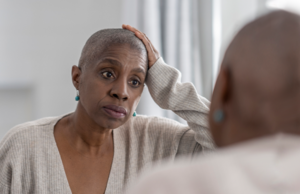You are not alone.
Know that the blood cancer community is here to support you every step of the way.
What happens next?
Talking to family and friends
Telling your children
Speaking with your employer
Preparing for appointments
Understanding lab results
Asking for a second opinion
Coping with fear, anxiety and stress
Taking care of your body
Managing fatigue and cognitive challenges
Understanding insurance and organizing finances
Experiences of others with CLL

Resources on CLL
Chronic Lymphocytic Leukemia
Learn about CLL, how it is diagnosed, an overview of treatments and what happens next.
Chronic Lymphocytic Leukemia (CLL) Treatment Discussion Guide
Beyond active surveillance (the ‘watch and wait approach’) there are several CLL treatments to consider. Each treatment has different features and side effects. It is important to be comfortable with the CLL treatment you choose.
Understanding and managing chronic lymphocytic leukemia (CLL)
A comprehensive guide to better understand CLL.
Immunotherapy
Learn about your immune system, understand immunotherapy and how it works.
Blood and Marrow Stem Cell Transplant
Get an overview of what your blood and bone marrow do; understand the different types of stem cell transplants; learn who is eligible for a stem cell transplant; find out how to prepare for a stem cell transplant; learn about recovery.
Minimal Residual Disease
Learn about Minimal residual disease (MRD), how it is diagnosed, an overview of treatments and what happens next.
Watch & Wait (active surveillance)
Learn about the watch and wait approach, understand the benefits and find out what it means for you.
Types of blood cancer treatments
You or your loved one has been diagnosed with a type of blood cancer. Cancer treatment can be complex, with different types of treatment options available for some blood cancers. What are they and how do they work? This fact sheet will help you Learn about the different treatment options available, Understand each type of treatment and how it can help, Prepa…
Understanding Genetics
Genetics plays an important role in understanding cancer and treatments for cancers. What is genetics and how is it involved in cancer?
Shared Decision Making: Discussion tool for people with a blood cancer
You or your loved one has been diagnosed with a type of blood cancer. You will be making important decisions with your healthcare team.
Chronic Lymphocytic Leukemia: A Conversation with Andy Friedman
Andy Friedman returned to Ontario from BC’s Gabriola Island with a plan to spend more time with his grandchildren. What he did not plan on was a chronic lymphocytic leukemia diagnosis. In this episode, Andy talks about the good and bad of his post-diagnosis life, including his experience with watch and wait. He also shares two important pieces of advice for …
Managing Long Term Side Effects with Amy Pulsifer
Amy Pulsifer talks about her experience managing long term effects due to her Chronic Lymphocytic Leukemia (CLL).
CLL with Dr Kuruvilla
Dr. Philip Kuruvilla talks to us about current chronic lymphocytic leukemia (CLL) treatment options, potential side effects and how to manage them.
Chronic Lymphocytic Leukemia (CLL) - Research Update with Dr. Gilles Robichaud
Dr. Gilles Robichaud speaks about CLL research. He shares information about his current research and how it could help inform CLL treatment in the future.
Eric Pitters - CLL Watch and Wait
It's not at all surprising that when Eric Pitters was diagnosed with chronic lymphocytic leukemia (CLL) he told his doctor, "I've got a cancer and I want it treated now." However, his doctor explained that it would be best to use an approach called Watch & Wait. Several studies have shown that early treatment does not have benefits for low-risk blood cancer…
Chronic lymphocytic leukemia (CLL): Advances in research & treatment: 2024 Leukemia Conference, LLSC
Chronic lymphocytic leukemia (CLL) is the most common type of leukemia in adults and can vary from person to person. This is why a one-size-fits-all treatment approach is not optimal. Research advances in how we treat CLL are discussed by Dr. Anthea Peters, Hematologist at the Cross Cancer Institute in Edmonton, and Associate Professor, Department of Oncolog…
Chronic lymphocytic leukemia (CLL) and your genes
When you are first diagnosed with chronic lymphocytic leukemia (CLL), you may have genetic tests on your leukemia cells. Doctors uses tests such as fluorescent in-situ hybridization (FISH) and DNA sequencing to look for changes in chromosomes and genes, such as whether part of a chromosome is missing or deleted, or mutations.
These genetic tests help doctor…
New Treatment Guidelines to Chronic Lymphocytic Leukemia (CLL): Latest advances & treatments
In this 1-hour webcast, Dr. Versha Banerji, a Canadian leader in CLL treatment and research, have provided the latest information on CLL diagnosis and treatment options. Dr. Banerji spoke about who the disease affects and how it progresses, how decisions are made about when to treat and the factors that influence the choice of treatment, the new CLL treatmen…
Understanding CLL
Short animated video describing the chronic Lymphocytic Leukemia (CLL)
Active surveillance of Chronic lymphocytic leukemia (CLL)
Short animated video about the active surveillance approach (watch and wait) to help you understand the benefits and find out what it means for you.
Treatment Options for Chronic Lymphocytic Leukemia
A short video describing treatment options for CLL
New frontiers and emerging treatments for CLL
Join Dr.Versha Banerji, a Canadian leader in CLL treatment and research, who will provide the latest in the diagnosis and treatment of the disease.
All resources
Access all fact sheets, guides, podcast, videos and other resources to learn everything from disease symptoms, statistics and treatment options.
About your subtype
Doctors classify chronic lymphocytic leukemia (CLL) into subtypes by using various tests. The subtype plays a large part in deciding the type of treatment.
Nodular
Interstitial
Mixed
Diffuse


















